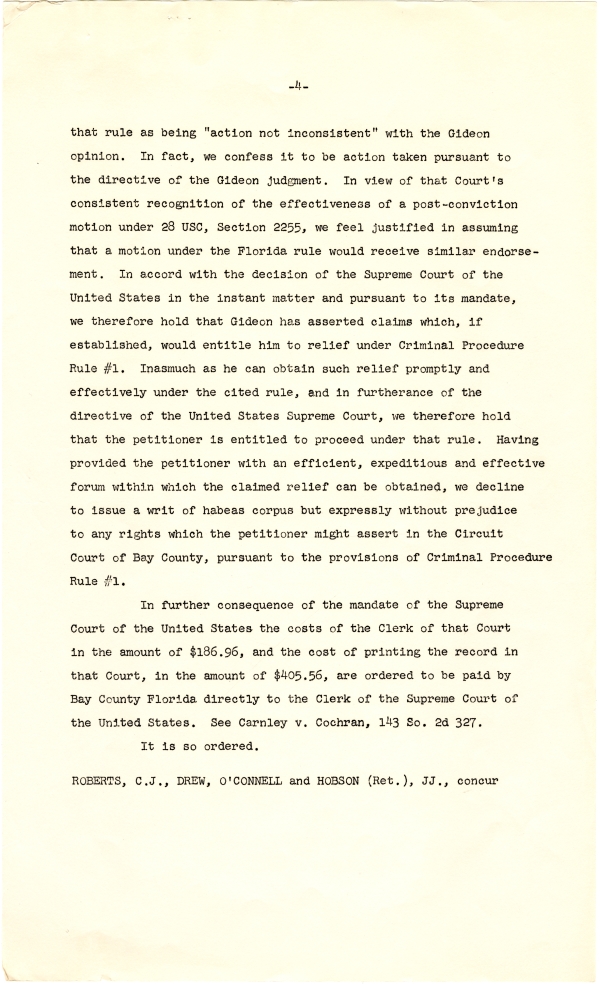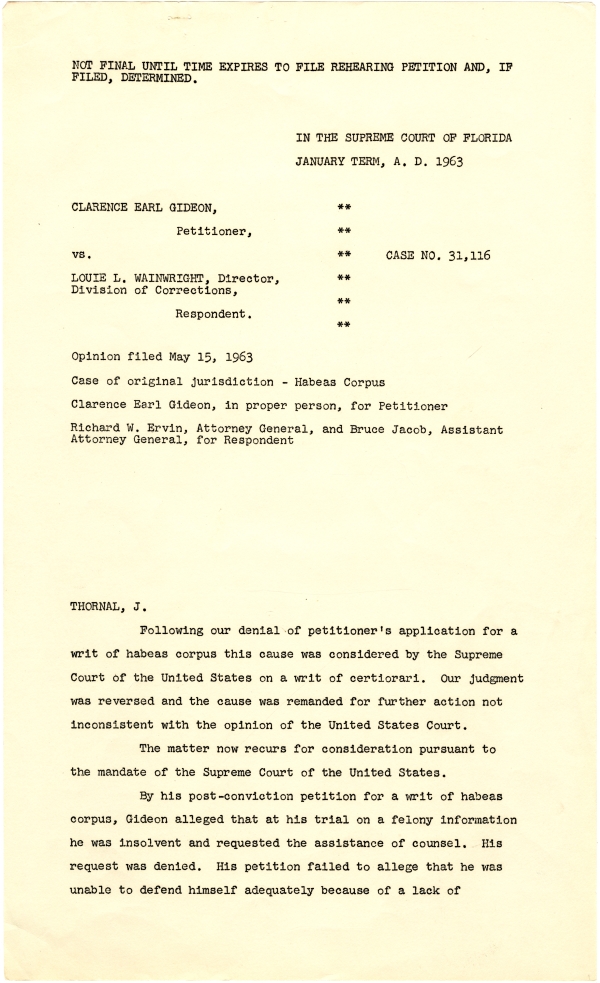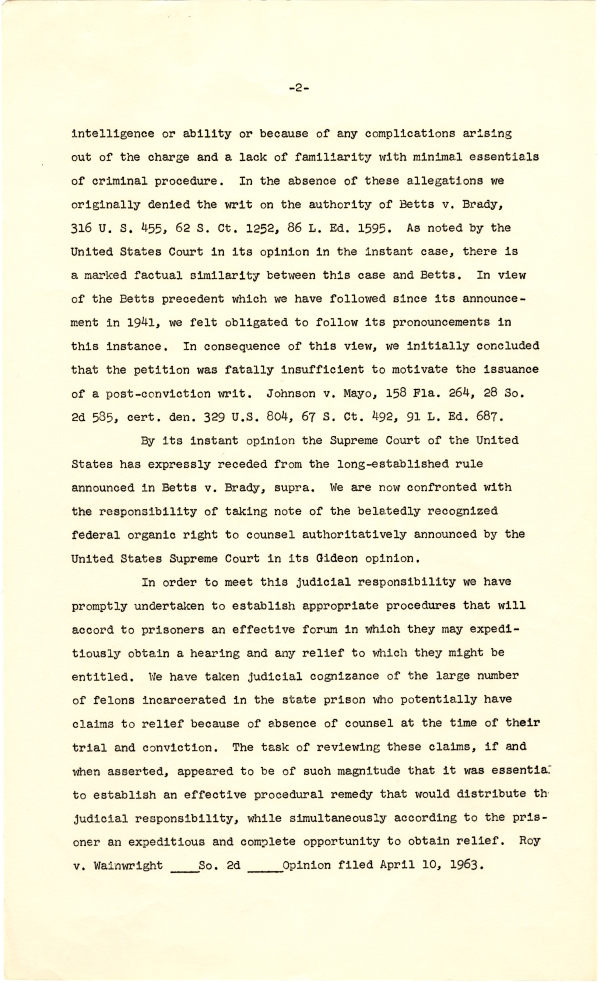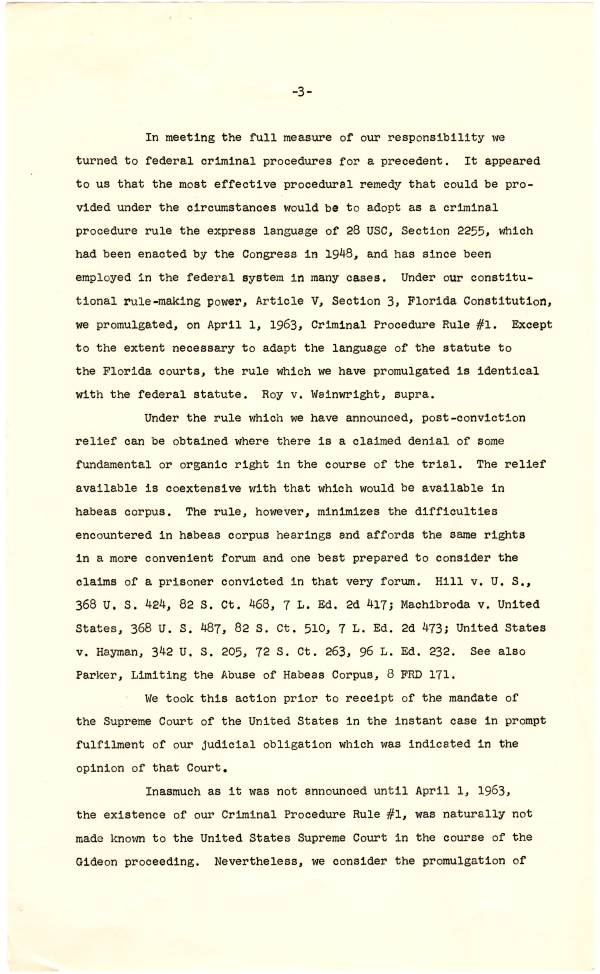Florida Memory is administered by the Florida Department of State, Division of Library and Information Services, Bureau of Archives and Records Management. The digitized records on Florida Memory come from the collections of the State Archives of Florida and the special collections of the State Library of Florida.

State Archives of Florida
- ArchivesFlorida.com
- State Archives Online Catalog
- ArchivesFlorida.com
- ArchivesFlorida.com
State Library of Florida
Related Sites

Description of previous item
Description of next item

Source
Description
Date
Format
Coverage
Topic
Subjects
Drew, E. Harris, 1903-1978
Due process of law
False imprisonment
Florida--Supreme Court Justice (1949-1976 : Roberts)
Florida. Division of Corrections
Florida. Supreme Court Justice (1948-1962 : Hobson)
Florida. Supreme Court Justice (1952-1971 : Drew)
Florida. Supreme Court Justice (1955-1967 : O'Connell)
Florida. Supreme Court Justice (1955-1970 : Thornal)
Gideon, Clarence Earl, 1910-1972
Hobson, T. Frank (Tolbert Francis), 1900-1966
O'Connell, Stephen Cornelius, 1916-2001
Petition, Right of
Right to counsel
Roberts, B. K. (Bonnie Kaslo), 1907-1999
Wainwright, Louie Lee (Louis), 1923-
Geographic Term
General Note
-4-
that rule as being “action not inconsistent” with the Gideon opinion. In fact, we confess it to be action taken pursuant to the directive of the Gideon judgment. In view of that Court’s consistent recognition of the effectiveness of a post-conviction motion under 28 USC, Section 2255, we feel justified in assuming that a motion under the Florida rule would receive similar endorse- ment. In accord with the decision of the Supreme Court of the United States in the instant matter and pursuant to its mandate, we therefore hold that Gideon has asserted claims which, if established, would entitle him to relief promptly and effectively under the cited rule, and in furtherance of the directive of the United States Supreme Court, we therefore hold that the petitioner is entitled to proceed under that rule. Having provided the petitioner with an efficient, expeditious and effective forum within which the claimed relief can be obtained, we decline to issue a writ of habeas corpus but expressly without prejudice to any rights which the petitioner might assert in the Circuit Court of Bay County, pursuant to the provisions of Criminal Procedure Rule #1.
In further consequence of the mandate of the Supreme Court of the United States the costs of the Clerk of the Court in the amount of $186.96, and the cost of printing the record in that Court, in the amount of $405.56, are ordered to be paid by Bay County Florida directly to the Clerk of the Supreme Court of the United States. See Carnley v. Cochran, 143 So. 2d 327.
It is so ordered.
ROBERTS, C.J., DREW, O’CONNELL and HOBSON (Ret.), JJ., concur
Title
Subject
Description
Creator
Source
Date
Format
Language
Type
Identifier
Coverage
Geographic Term
Thumbnail
ImageID
topic
Subject - Corporate
Subject - Person
Transcript
NOT FINAL UNTIL TIME EXPIRES TO FILE REHEARING PETITION AND, IF FILED, DETERMINED.
IN THE SUPREME COURT OF FLORIDA
JANUARY TERM, A. D. 1963
CLARENECE EARL GIDEON,
Petitioner,
vs.
LOUIE L. WAINWRIGHT, Director,
Division of Corrections,
Respondent.
CASE NO. 31,116
Opinion filed May 15, 1963
Case of original jurisdiction – Habeas Corpus
Clarence Earl Gideon, in proper person, for Petitioner
Richard W. Ervin, Attorney General, and Bruce Jacob, Assistant Attorney General, for Respondent
THORNAL, J.
Following our denial of petitioner’s application for a writ of habeas corpus this cause was considered by the Supreme court of the United States on a writ of certiorari. Our judgment was reversed and the cause was remanded for further action not inconsistent with the opinion of the United States Court.
The matter now recurs for consideration pursuant to the mandate of the Supreme Court of the United States.
By his post-conviction petition for a writ of habeas corpus, Gideon alleged that at his trial on a felony information he was insolvent and requested the assistance of counsel. His request was denied. His petition failed to allege that he was unable to defend himself adequately because of a lack of
-2-
intelligence or ability or because of any complications arising out of the charge and a lack of familiarity with minimal essentials of criminal procedure. In the absence of these allegations we originally denied the writ on the authority of Betts v. Brady, 316 U. S. 455, 62 S. Ct. 1252, 86 L. Ed. 1595. As noted by the United States Court in its opinion in the instance case, there is a marked factual similarity between this case and Betts. In view of the Betts precedent which we have followed since its announce- ment in 1941, we felt obligated to follow its pronouncements in this instance. In consequence of this view, we initially concluded that the petition was fatally insufficient to motivate the issuance of a post-conviction writ. Johnson v. Mayo, 158 Fla. 264, 28 So. 2d 585, cert. den. 329 U.S. 804, 67 S. Ct. 492, 91 L. Ed. 687.
By its instant opinion the Supreme Court of the United States has expressly receded from the long-established rule announced in Betts v. Brady, supra. We are now confronted with the responsibility of taking note of the belatedly recognized federal organic right to counsel authoritatively announced by the United States Supreme Court in its Gideon opinion.
In order to meet this judicial responsibility we have promptly undertaken to establish appropriate procedures that will accord to prisoners an effective forum in which they may expedi- tiously obtain a hearing and any relief to which they might be entitled. We have taken judicial cognizance of the large number of felons incarcerated in the state prison who potentially have claims to relief because of absence of counsel at the time of their trial and conviction. The task of reviewing these claims, if and when asserted, appeared to be of such magnitude that it was essential to establish an effective procedural remedy that would distribute the judicial responsibility, while simultaneously according to the pris- oner an expeditious and complete opportunity to obtain relief. Roy v. Wainwright ____So. 2d ____Opinion field April 10, 1963.
-3-
In meeting the full measure of our responsibility we turned to federal criminal procedures for a precedent. It appeared to us that the most effective procedural remedy that could be pro- vided under the circumstances would be to adopt as a criminal procedure rule the express language of 28 USC, Section 2255, which had been enacted by the Congress in 1948, and has since been employed in the federal system in many cases. Under our constitu- tional rule-making power, Article V, Section 3, Florida Constitution, we promulgated, on April 1, 1963, Criminal Procedure Rule #1. Except to the extent necessary to adapt the language of the statute to the Florida courts, the rule which we have promulgated is identical with the federal statute. Roy v. Wainwright, supra.
Under the rule which we have announced, post-conviction relief can be obtained where there is a claimed denial of some fundamental or organic right in the course of the trial. The relief available is coextensive with that which would be available in habeas corpus. The rule, however, minimizes the difficulties encountered in habeas corpus hearings and affords the same rights in a more convenient forum and one best prepared to consider the claims of a prisoner convicted in that very forum. Hill v. U. S., 368 U. S. 424, 82 S. Ct. 468, 7 L. Ed. 2d 417; Machibroda v. United States, 368 U. S. 487, 82 S. Ct. 510, 7 L. Ed. 2d 473; United States v. Hayman, 342 U. S. 205, 72 S. Ct. 263, 96 L. Ed. 232. See also Parker, Limiting the Abuse of Habeas Corpus, 8 FRD 171.
We took this action prior to receipt of the mandate of the Supreme Court of the United States in the instant case in prompt fulfillment of our judicial obligation which was indicated in the opinion of the court.
Inasmuch as it was not announced until April 1, 1963, the existence of our Criminal Procedure Rule #1, was naturally not made known to the United States Supreme Court in the course of the Gideon proceeding. Nevertheless, we consider the promulgation of
-4-
that rule as being “action not inconsistent” with the Gideon opinion. In fact, we confess it to be action taken pursuant to the directive of the Gideon judgment. In view of that Court’s consistent recognition of the effectiveness of a post-conviction motion under 28 USC, Section 2255, we feel justified in assuming that a motion under the Florida rule would receive similar endorse- ment. In accord with the decision of the Supreme Court of the United States in the instant matter and pursuant to its mandate, we therefore hold that Gideon has asserted claims which, if established, would entitle him to relief promptly and effectively under the cited rule, and in furtherance of the directive of the United States Supreme Court, we therefore hold that the petitioner is entitled to proceed under that rule. Having provided the petitioner with an efficient, expeditious and effective forum within which the claimed relief can be obtained, we decline to issue a writ of habeas corpus but expressly without prejudice to any rights which the petitioner might assert in the Circuit Court of Bay County, pursuant to the provisions of Criminal Procedure Rule #1.
In further consequence of the mandate of the Supreme Court of the United States the costs of the Clerk of the Court in the amount of $186.96, and the cost of printing the record in that Court, in the amount of $405.56, are ordered to be paid by Bay County Florida directly to the Clerk of the Supreme Court of the United States. See Carnley v. Cochran, 143 So. 2d 327.
It is so ordered.
ROBERTS, C.J., DREW, O’CONNELL and HOBSON (Ret.), JJ., concur
General Note
Chicago Manual of Style
Thornal, B. Campbell (Benjamin Campbell), 1908-1970. Order of the Florida Supreme Court Regarding Gideon v. Wainwright, 1963. 1963-05-15. State Archives of Florida, Florida Memory. <https://www.floridamemory.com/items/show/339318>, accessed 30 November 2024.
MLA
Thornal, B. Campbell (Benjamin Campbell), 1908-1970. Order of the Florida Supreme Court Regarding Gideon v. Wainwright, 1963. 1963-05-15. State Archives of Florida, Florida Memory. Accessed 30 Nov. 2024.<https://www.floridamemory.com/items/show/339318>
AP Style Photo Citation
(State Archives of Florida/Thornal)

 Listen: The FolkFolk Program
Listen: The FolkFolk Program

